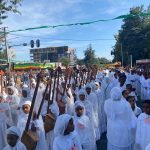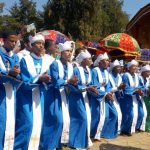The Ethiopian cultural ambassadors of the region who participated in the 17th nationalities, nationalities and peoples day celebration at Hawassa international stadium.
Ethiopia is the home for different ethnic groups having their own language and culture. Irrespective of such differences, the state building project has been characterised by power centralisation which did not considered political pluralism and multiculturalism. Ethiopia is the second largest populace country in Africa and has nine regions and two city administrations. South Nations Nationalities and Peoples Region (SNNPR) state is the third populace and most densely populated region in Ethiopia.








 The current system in Ethiopia is ethno-cantered: regions, power, party and privilege are all ethnic based. Beyond respecting, the system gave political meaning to identity and manipulated it for power and other benefits. The problem is not respecting identity; however, the problem is that the federal system has created politicised identity and ethnic nationalism. Things are observed through the lens of ethnicity and ethnic identity becomes political instrument. This opened the room for ethnic elites and politicians to trigger conflicts. Politicians and local elites manipulate ethnicity and trade-off it for different purpose.
The current system in Ethiopia is ethno-cantered: regions, power, party and privilege are all ethnic based. Beyond respecting, the system gave political meaning to identity and manipulated it for power and other benefits. The problem is not respecting identity; however, the problem is that the federal system has created politicised identity and ethnic nationalism. Things are observed through the lens of ethnicity and ethnic identity becomes political instrument. This opened the room for ethnic elites and politicians to trigger conflicts. Politicians and local elites manipulate ethnicity and trade-off it for different purpose.
The cultural ambassador of the region who participated in the 17th day of nations, nationalities and peoples.

















 The Ethiopian experiment with ethnic-based federal system is arguably precipitated by historical grievances that the various ethnic communities had with successive Ethiopian regimes. However, the system that has been put in place to address such historical ills is producing serious impediments for the free mobility of citizens within and across state lines and thereby posing a threat to peaceful coexistence.
The Ethiopian experiment with ethnic-based federal system is arguably precipitated by historical grievances that the various ethnic communities had with successive Ethiopian regimes. However, the system that has been put in place to address such historical ills is producing serious impediments for the free mobility of citizens within and across state lines and thereby posing a threat to peaceful coexistence.










The constitution has also provided for the adoption of democratic form of governance through which ethnic self-determination and self-development would be mediated. In the new dispensation, each titular group or a group of titular groups was empowered to control a regional state. In this manner, the new constitution recognised the centrality of ethnic cleavages in regulating access to power and resources.



























 The assumption was that if ethnic groups were to exercise self-rule in their respective federal sub-units and participate, via their representatives, in the federal government, it would engender the sense of inclusion on the part of constituent ethnic communities and thereby create a fertile ground not only for better inter-group relations but also for the emergence of one strong politico-economic community.
The assumption was that if ethnic groups were to exercise self-rule in their respective federal sub-units and participate, via their representatives, in the federal government, it would engender the sense of inclusion on the part of constituent ethnic communities and thereby create a fertile ground not only for better inter-group relations but also for the emergence of one strong politico-economic community.
- CULTURE PLAYS AN IMPORTANT ROLE IN ECONOMIC DEVELOPMENT - May 28, 2024
- THE WEEKEND MARKETS IN ABINET SQUARE, LIDETA SUB-CITY, ETHIOPIA - April 21, 2024
- GOLDEN KNIGHTS OF THE HOLY ROMAN EMPIRE, KNIGHTS OF THE GOLDEN SPUR - February 14, 2024
















